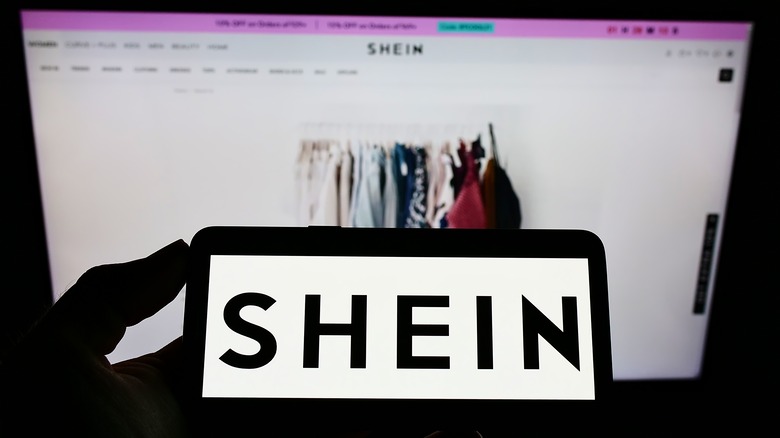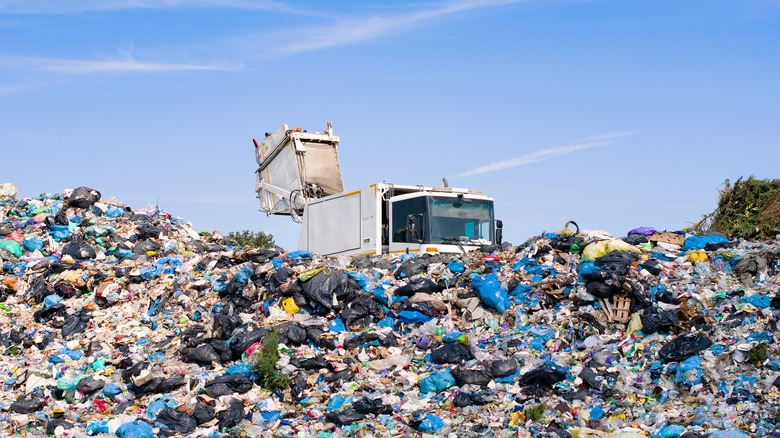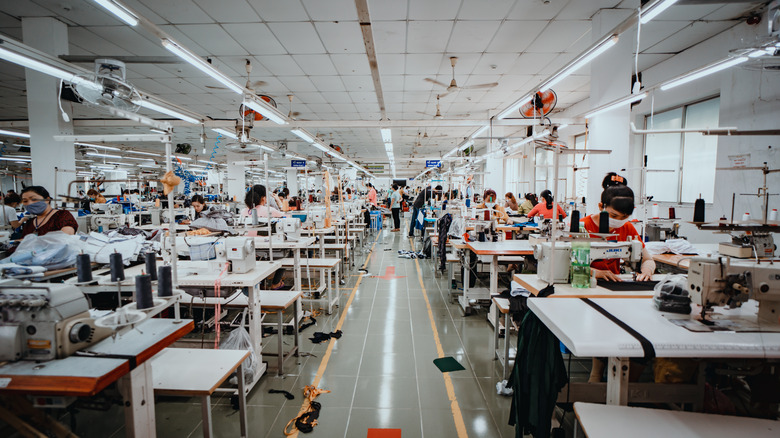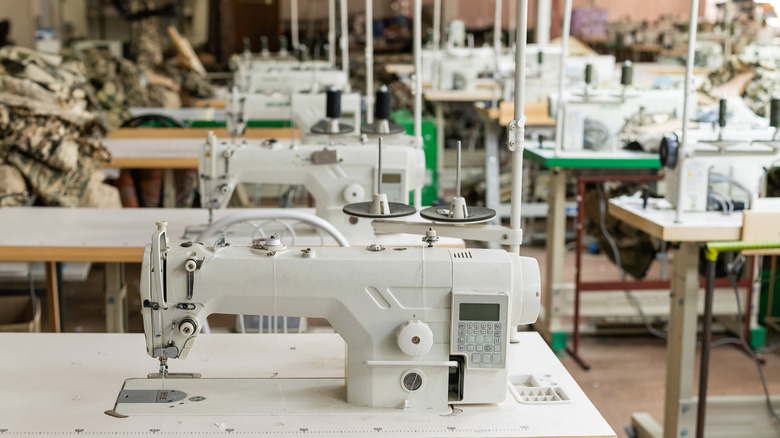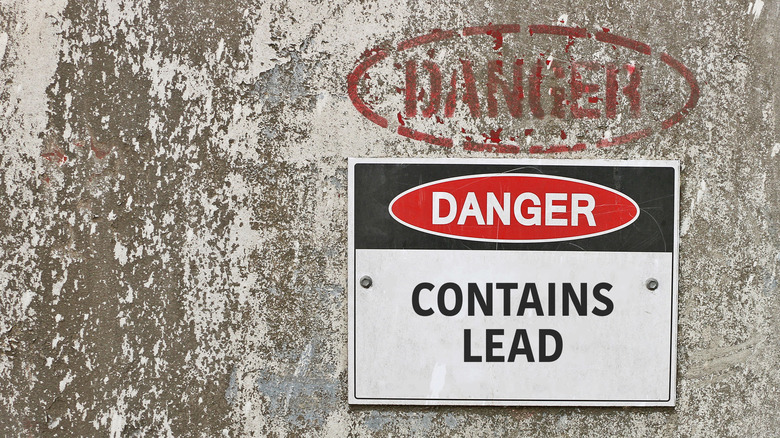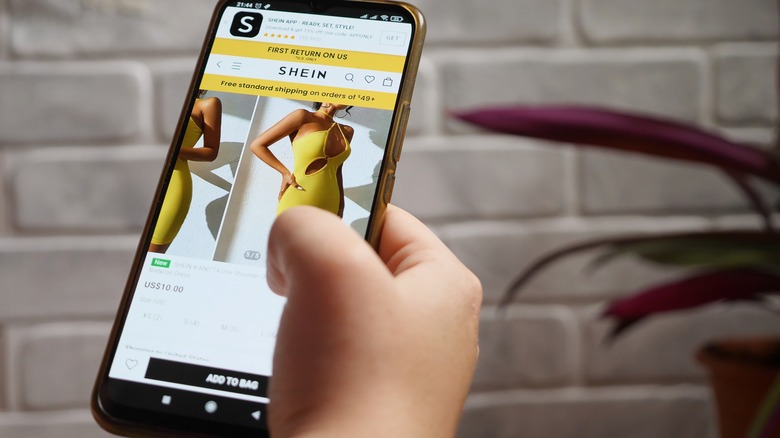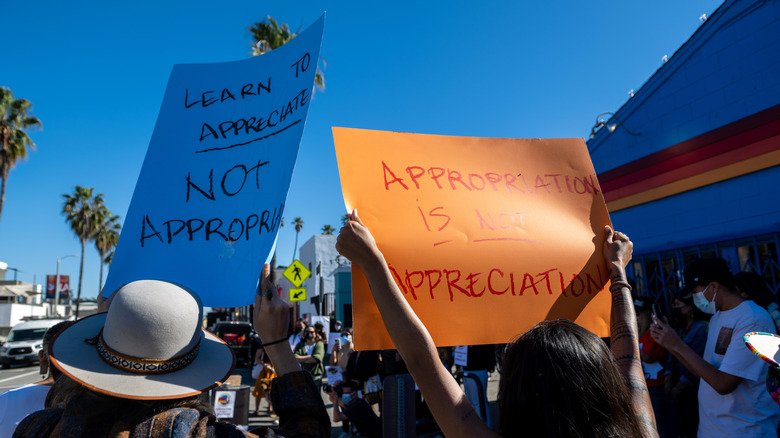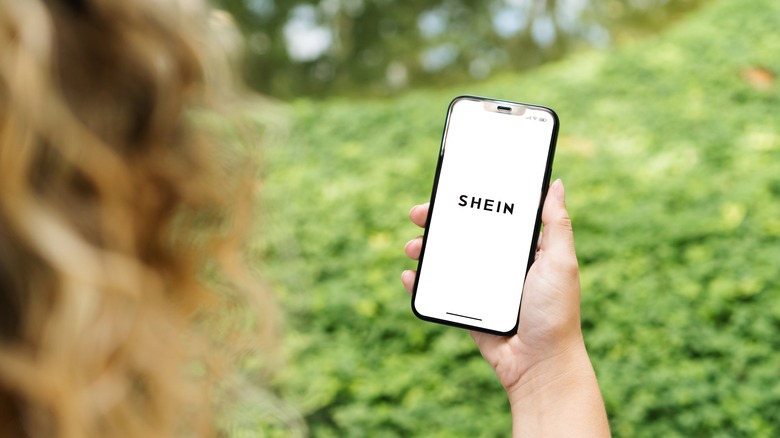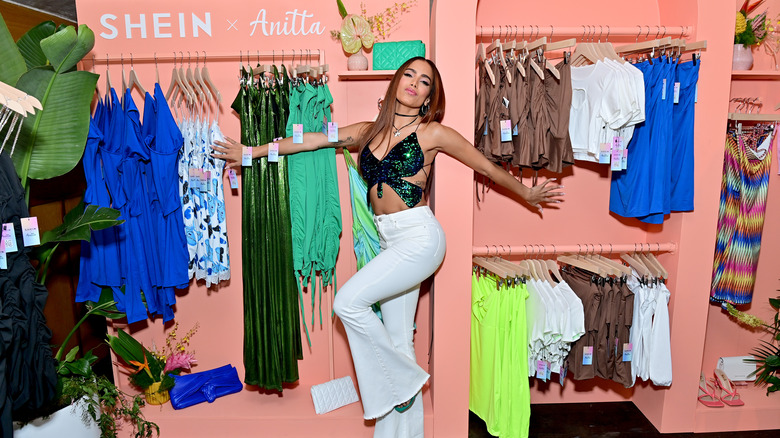Before Shopping At Shein Again, Here's Everything You Need To Know
With an astounding estimated revenue of over $15 billion in 2021, Shein has taken the fashion world by storm since it was founded by Chris Xu back in 2012 (via Reuters). Shein is one of many fast-fashion retailers nowadays, but the company is unique in the sheer number of new styles it uploads to its website each and every single day. According to a 2022 Wired report, this number is a shocking 6,000, whereas other fast-fashion brands like Gap, H&M, and Zara typically offer somewhere between 30 to 100 new styles within the same time period. Clearly, this model works for Shein, because, according to Earnest Research, the retailer now tops every fast-fashion brand in market shares.
Even though it's existed for a while, Shein has really increased its popularity since 2020. Apart from the speed and abundance with which the company updates its website, Shein is also unique in its reliance on social media influencers for marketing. As Wired reported, the brand sends free clothes to influencers, who then make content featuring the items they receive — some of which become the famous Shein hauls — and offer discount codes to their followers, from which they often receive a commission. Shein is a huge name on social media, but there is a lot of information and history regarding the brand that most influencers aren't mentioning. Before you consider adding another fitted mini skirt or crop top to your Shein cart, you should know a few things.
As a fast-fashion company, Shein's practices are innately bad for the environment
Producing clothes, in itself, negatively impacts the environment in a number of ways. For one thing, polyester — a material that Greenpeace predicts is used in 60% of modern clothing — emits more greenhouse gases (like CO2) than alternative materials, like cotton (via World Research Institute). Also, when washed, polyester releases microplastics (which can take decades to centuries to break down) into the ocean, harming marine and human species when ingested, per The Guardian. Apart from this, the fashion industry is the second largest industry in terms of its water consumption, which makes sense considering that just one pair of jeans requires nearly 2,000 gallons of water to produce (via National Geographic).
Fast fashion, which refers to inexpensive and trendy clothes being produced at an inhumane speed to meet public demand, especially damages the environment due to the mind-blowing abundance of clothing being produced in such a short time period. A McKinsey Sustainability article found that clothing production doubled between 2000 and 2014, and people now keep their clothes for only half as long as they did back in 2000. Because of this, millions of tons of clothing end up in landfills each year.
While the fashion industry — most specifically, the fast-fashion industry — isn't the sole cause of the world's environmental issues, it is a major factor. If its growth continues as it's projected to, the Ellen MacArther Foundation predicts that its environmental impacts will be drastic. As Vauhini Vara wrote in Wired, "This [damage] isn't unique to Shein, but Shein's success makes it especially notable."
The people who make Shein's products are reportedly overworked and underpaid
The low prices of Shein's items — along with tags reading messages like "help" that have gone viral on social media (but have since been debunked) — have prompted questions and concerns about the work conditions in Shein's factories. Shein's website doesn't include much information regarding the location(s) of its distribution site(s), but Public Eye, an NGO that focuses on "denouncing harmful actions and proposing specific solutions," discovered that it employs several smaller suppliers in Guangzhou. a city in south China.
According to a Public Eye report published in 2021, customers' orders are automatically distributed among these suppliers, meaning that they can quickly produce and ship out new items — quickly as in it only takes one week for an item to be made and sent out — which has led to concerns about the conditions of these workspaces.
In 2020, a researcher interviewed 10 people who worked at companies that supply Shein's products and reported her findings back to Public Eye. She discovered that these supply sites were riddled with fire hazards, such as blocked entrances and exits, second-story windows barred shut, and no emergency exits. She was told that employees worked for up to 75 hours a week, which is not only inhumane but also highly illegal, according to Chinese labor law. Not a single interviewee could provide a contract of employment, which is also illegal, and only one of these sites enforced a minimum income — the other factories enforced a pay-per-item model (a maximum of 47 cents per item).
Shein lacks transparency when it comes to its supply sites' working conditions
Apart from the Public Eye report, there is little to no information that confirms whether or not Shein is enforcing policies that protect workers on its production sites. According to a 2021 report by Reuters, Australia requires companies that make over $100 million AUD annually to submit a "modern slavery statement" to the Australian Border Force (ABF) every year. They claimed that Shein had not submitted this required statement by the time of publishing.
Similarly, Reuters reported that the Modern Slavery Act of 2015 requires companies who do business in the United Kingdom and bring in more than 36 million pounds of items a year to state the actions they are taking to work against forced labor. Reuters found that, in the past, Shein falsely claimed that the conditions in their factories were certified by international labor standards. As of this writing, the fashion brand's website simply states that it "[supports] the ten principles [of the United Nations Sustainable Development Goals] focused on human rights, labor, environment, and anti-corruption."
In September 2021, Shein updated its website to include a "Supply Chain Transparency Statement" and a code of conduct that its suppliers and manufacturers must agree to. The code of conduct states, among other things, that working hours should be arranged "reasonably" to comply with local laws and that workspace environments should be "safe, hygienic and healthy." While it's possible that Shein has better carried out its code of conduct since the Public Eye report was published, it's generally unknown how or if they are enforcing it at their supply sites.
High levels of lead and phthalates have been found in Shein products
In October 2021, CBC Marketplace conducted an investigation to identify potentially toxic chemicals in products from fast-fashion brands like Shein, Zaful, and AliExpress. Out of 38 samples of children's, adults', and maternity-wear clothing and accessories, CBC Marketplace found that one in every five items had "concerning" levels of chemicals like lead, PFAS, and/or phthalates.
Of these products, researchers at the University of Toronto found that two Shein items — a jacket made for toddlers as well as a red purse — contained higher amounts of lead than is healthy. The jacket tested as having 20 times the amount of lead that is safe for children to be exposed to, and the purse, five. Along with this, a children's tutu dress from Shein was tested as having an elevated (but not necessarily unsafe) amount of phthalates.
CBC reported that lead exposure can damage the heart, brain, kidneys, and reproductive system; and contamination can be especially harmful to infants and children, making the levels found in the children's jacket that much more dangerous. Miriam Diamond, environmental chemist and University of Toronto professor, pointed out to CBC that this contamination is not only unsafe for shoppers but also for the individuals actually producing these items. CBC reports that since being alerted of the contaminations, Shein has removed the flagged products from their website and stopped working with the suppliers of these products until they've completed their own investigation and taken any necessary action(s).
Shein has repeatedly been accused of stealing designs
On more than a few occasions, Shein has been accused of ripping off designs from both well-known names in fashion and lesser-known, independent stores and individuals. These designs vary from clothing to art prints to enamel pins. While more renowned companies, like Levi Strauss and Ralph Lauren have taken their accusations against Shein to court, many of the smaller designers who Shein has allegedly stolen from have turned to social media to call out the fast-fashion brand (via Dazed).
For example, Elexiay, which defines itself as a "small, Black-owned, independent, sustainable business" — whose 40,000 followers pales in comparison to Shein's 25.8 million — took to Instagram to air their frustrations with the fast-fashion company copying the design of their Amelia sweater. The sweater retails for $330 on their website and $17 on Shein's. "Our artisans, all women in Nigeria, spend 4-5 days crocheting such beautiful piece of art. It's quite disheartening to see such talent and hard work reduced to a machine made copy," the brand wrote on Instagram back in July 2021.
As Francesca Witzburg explained to Dazed, there is little protection for fashion designs in the United States when it comes to intellectual property and design laws. Because of this, Shein rarely faces any repercussions for ripping off smaller designers and artists. In fact, according to Dazed, Shein's team often ignores designers' emails regarding trademark and copyright infringement. If the designers are lucky, Shein will simply take the allegedly copied product(s) down from their website. Even though a spokesperson for the brand claims that it "fully respects the intellectual property rights of others," Shein continues to skirt by, creating products that are recognizable but not exact copies of trending items, NPR writes.
Shein has been accused of cultural insensitivity and cultural appropriation
Social media users, various media outlets, and even the Mexican government have criticized some of the products that Shein has carried on its website due to cultural appropriation and cultural insensitivity. A notorious example is the swastika necklace. In July 2020, a scandal sparked when Instagram and Twitter users — notably Marissa Casey Grossman — shared posts that displayed what Shein called a "swastika pendant necklace" being sold on the website (via Refinery29). There was, of course, almost immediate backlash on social media and, according to CBS News, users accused Shein of anti-semitism and demanded people stop supporting their brand. Shein eventually removed the necklace from its website and apologized on social media, claiming on Instagram that the pendant represented a Buddhist symbol for "spirituality and good fortune."
The retailer has also been criticized for selling traditionally Muslim prayer rugs as "fringe trim carpets" as well as phone cases depicting a handcuffed Black man's figure being outlined in chalk by a white hand (which ended up being a stolen design, nonetheless) — both of which have since been removed from the website. Shein has issued apologies for these offenses and made a "vow to do a much better job". Additionally, the company revealed it "formed a product review committee with staff from different cultures and religions" to avoid repeating past mistakes; however, they've continued to face accusations of insensitivity and appropriation.
Shein sells items that generally lack in quality
With Shein's prices being so low, it's probably not surprising that the quality of its products is generally not the best. Although the influencers who work with the brand consistently rave about and flaunt their Shein clothes on social media applications like TikTok and Instagram, shoppers who aren't affiliated with the company sometimes share different opinions. One TikTok user shared a video claiming that one Shein shirt she owned is "literally worse quality than American Girl Doll clothing."Another shopper claimed that when her Shein package arrived, she initially thought she had accidentally ordered from a "fraudulent duplicate website" due to the surprisingly bad quality of the pair of pants she ordered (via Euronews).
While it's expected for Shein's quality to be subpar based on the website's prices, some Shein fails have been so shocking that they have actually proved newsworthy, such as one story about a woman's shoes melting while she attended a music festival. In May 2022, Emma Carrasco attended the Lovers & Friends festival in Las Vegas. She bought a new pair of shoes — Shein's Minamilist Platform Chunky Pumps — for the occasion, but they didn't end up lasting long. Carrasco told Insider that her heel melted and "deflated," as is shown in her viral video of the experience. "I'm shocked when [people] say they bought shoes from Shein like bby with that quality y'all are brave lol," one person tweeted.
Shein is trying to limit its greenhouse gas emissions and overall carbon footprint
In an effort to better their reputation in terms of environmental, social, and governance (ESG)issues, Shein hired a group of new executives who aim to change how the general public views the fashion retailer, Bloomberg reported in June 2022. The most notable hire is Adam Whinston, the brand's new global head of ESG, who is largely in charge of positively changing Shein's image and introducing a more sustainable model to the company.
According to Whinston, Shein's 6,000 new styles per day feature is more sustainable than it seems. In a conference, he claimed that these new styles are created in small batches, which allows the company to figure out which of its styles are most popular before they commit to manufacturing large batches of clothing. Along with this, Whinston has shared that Shein plans to reduce its greenhouse gas emissions by sending more products by ship than by air. He also said that the brand wishes to make its supply sites more energy efficient and incorporate recycled fibers into its products more often.
While these are obviously positive changes that Shein should make, they may not be enough. "It's still a lot of production of clothing that's not really meant to be worn for a long period of time," Samantha Sharpe, an associate professor and research director at the University of Technology Sydney's Institute for Sustainable Futures, told Bloomberg. "I don't think it is possible for fast fashion or ultrafast fashion to ever be truly sustainable," she added.
Initiatives like Shein X have been launched in an effort to support up-and-coming designers
In January 2021, after repeatedly being accused of ripping off independent designers, Shein launched Shein X, a program intended to "inspire and support young designers to chase their dreams," according to the company's website. Since then, the program has worked with around 1,500 designers and artists from all across the world, according to PR Newswire. Specifically, Shein helps its Shein X designers with manufacturing, marketing, and sales while allowing them ownership over their designs and a piece of their line's profit.
"The fashion industry is competitive, and many talented designers struggle to be seen. Through SHEIN X, our goal is to help elevate and empower the next generation of designers and artists," President of Shein U.S. George Chiao said of the program, according to PR Newswire.
Shein X has partnered with people like artist Donna Adi, Nigerian fashion designer Ngozika Okeke, and SHEIN x 100K challenge winner Sashagai (Sasha) Ruddock. In July 2022, Okeke launched her second collection with Shein and told Black Enterprise, "I could have never imagined 14 years ago that a leading global brand like SHEIN would reach out to me to collaborate with them and help me grow my personal brand. I'm truly thankful for their support and collaboration." Additionally, Adi, who launched a collection with Shein in August 2022, told Cosmopolitan, "I know how difficult it is to start from zero, and it's incredible that they started a platform to help [artists] gain exposure. The incubator program helps with finances, marketing, community, supply chain, and career support to help them achieve their own art career."
